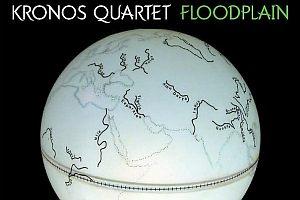There’s so much music, and more, in Kronos’ latest CD that I felt compelled to question the quartet’s founder and violinist David Harrington at his Sunset District base of operations, seeking details and explanations beyond the liner notes. Much of that conversation will be the source of a future artist profile. But in examining this album, it’s worth considering its inception as Harrington’s reaction to the undeclared war in Iraq. “At a certain point,” he says, “I decided that, if [certain countries] are on George Bush’s ‘enemies’ list, I needed to know more about them.” The album thus showcases traditional, contemporary, and commissioned works from Iraq, Iran, and Palestine, as well as other parts of the Middle East, along with Egypt, Ethiopia, India, and Serbia. Most of these places, and many of the album’s tracks, share roots in Persian and Arabic musics — manifest in particular harmonic modes and rhythms and in the use of microtones and slide techniques, all successfully and creatively adopted and adapted, as always, by Harrington, fellow violinist John Sherba, violist Hank Dutt, and cellist Jeffrey Zeigler.
Listen to the Music
Significant syntheses and varieties are also evident among the tracks, some of which have prompted Kronos to alter its instruments or take up new ones. Harrington, for example, fitted his violin with two A and two D strings to produce the primal sound of an Iranian lullaby, and even took instruction from YouTube videos on the single-stringed Balkan gusle. The results overall are as dazzling as they are broadly educational, in the spirit of Northern California guitarist Bob Brozman’s similarly adaptive global explorations. Scenes on Floodplain shift from the saturated sound of an Egyptian orchestra on the opening track (achieved with extensive, meticulously staged studio overdubs) to a patient display in free time of the Indian affect of Dutt’s viola, an awesome (in the true sense of the word) contemplation of solitude evoked by a melody from Kazakhstan, the disturbing buzz of an Iraqi love song (enhanced by sound engineer and coproducer Scott Fraser), and a very different and gorgeous traditional love song from Lebanon that, in its melodic and harmonic structure and applied instrumental approach, suggests some of the historical sources of Western early music.
Folk string and percussion instruments figure on some tracks, and an entire Azerbaijani ensemble, with passionate father-and-daughter vocalists Alina and Fargana Qasimov, is heard on “Getme, Getme,” recorded live in London last fall. For what’s arguably the most sui generis selection, from Ethiopia, Kronos had one-of-a-kind instruments designed and built by Bay Area artisan Walter Kitundu, so delicate and large that they were untransportable for the Quartet’s recent concertizing across the U.S. and abroad, behind this album. (Harrington promises that they’ll be heard locally, with the onset of Kronos’ fall 2009 season.) The album’s final track, by the young Serbian composer and former San Francisco Conservatory student Aleksandra Vrebalov, is one of the album’s several longer suites, achieving an almost cinematic evocation of the perpetuation of differing religious and musical traditions and family values under the threat of persecution and armed conflict. This is music both timely and timeless, conceived and executed beautifully.

